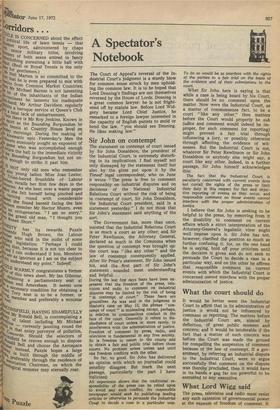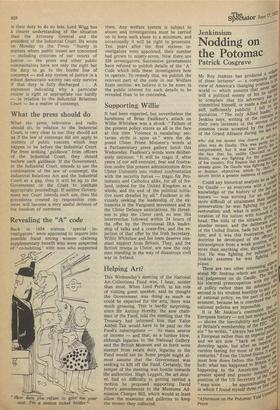A Spectator's Notebook
The Court of Appeal's reversal of the Industrial Court's judgment is a sturdy blow for common sense struck by men upholding the common law. It is to be hoped that Lord Denning's findings are not themselves reversed by the House of Lords. Denning is a great common lawyer: he is not frightened off by statute law. Before Lord Widgery became Lord Chief Justice, he remarked to a foreign lawyer interested in the capacity of English purists to mold or bend the law, "you should see Denning. He likes making law."
Sir John on contempt
The statement on contempt of court issued by Sir John Donaldson, the president of the Industrial Court, is extremely disturbing in its implications. I find myself not only dismayed by the statement itself but also by the gloss put upon it by the Times;" legal correspondent, who on June 9 wrote "The press is free to comment responsibly on industrial disputes and on decisions of the National Industrial Relations Court without the risk of being in contempt of court, Sir John Donaldson, the Industrial Court president, said in a statement yesterday." I do not think that Sir John's statement said anything of the sort.
The Government has, more than once, insisted that the Industrial Relations Court is as much a court as any other; and, Sir Peter Rawlinson, the Attorney General, declared as much in the Commons when the question of contempt was brought up: the court was "like any other" and the law of contempt consequently applied. After Sir Peter's statement, Sir John issued his, and the first part of Sir John's statement sounded most understanding and helpful: During the last few days fears have been expressed that the freedom of the press, television and radio to comment on industrial disputes may be limited by the risk of being "in contempt of court." These fears are groundless. As was said in the judgment in Heaton's case on May 12, the phrase "contempt of court " is misleading except, perhaps, in relation to contumacious conduct in the face of the court. Generally it refers to disobedience of court orders or, more rarely, to interference with the administration of justice. Freedom of comment by press, radio, and television is fundamental in any free society. So is freedom to resort to the courts and to obtain a fair and public trial before those courts. No problem arises unless and until one freedom conflicts with the other. So far, so good. Sir John has delivered an opinion with which no journalist could sensibly disagree. But mark the next passage, particularly the part I have
italicised:
All experience shows that the traditional responsibility of the press can be relied upon to avoid any such conflict. No responsible newspaper would seek by publishing leading articles or otherwise to persuade the Industrial Cou# to decide a case in a particular way. To do so would be to interfere with the rights of the parties to a fair trial on the basis of the evidence and of their submissions to the court.
What Sir John here is saying is that while a case is being heard by his Court, there should be no comment upon the matter. Now were the Industrial Court, as a matter of commonsense fact, to be a court "like any other," then matters before the Court would properly be sub judice and comment would indeed be improper, for such comment (or reporting) might prevent a fair trial through influencing a jury, or possibly otherwise through affecting the evidence of witnesses. But the Industrial Court is not, whatever Sir Peter Rawlinson or Sir John Donaldson or anybody else might say, a court like any other. Indeed, in a further passage, Sir John himself acknowledges this: The fact that the Industrial Court is peculiarly concerned with current events does not curtail the rights of the press or limit their duty in this respect for fair and objective reporting of events as they occur, and responsible comment on those events cannot interfere with the proper administration of justice.
I believe that Sir John is seeking to be helpful to the press, by removing from it the disability to comment on current affairs which a strict interpretation of the Attorney-General's legalistic view might well impose upon it. Sir John has not, however, clarified the position so much as further confusing it: for, on the one hand he is saying, hold off your criticism until the decision is given and do not seek to persuade the Court to decide a case in a particular way, and on the other he affirms that responsible comment on current events with which the Industrial Court is concerned cannot interfere with the proper administration of justice.
What the court should do
It would be better were the Industrial Court to affirm that in its administration of justice it would not be influenced by comment or reporting. The matters before the Industrial Court are, almost by definition, of great public moment and concern; and it would be intolerable if the fact that a matter of such concern was before the Court was made the ground for compelling the suspension of comment because of the law of contempt. If a government, by referring an industrial dispute to the Industrial Court, were to argue successfully that comment on the dispute was thereby precluded, then it would have in its hands a gag far too powerful to be entrusted to any executive.
What Lord Wigg said
The press, television and radio must resist any such extension of governmental power at the expense of freedom of comment. It is their duty to do no less. Lord Wigg has a clearer understanding of the situation than the Attorney General and the president of the Industrial Court. He wrote on Monday to the Times "Surely in matters where public issues are concerned — including criticism of our courts of justice — the press and other public commentators have not only the right but the duty to go to the border line of contempt — and any system of justice in a robust democratic society can only survive if that duty is fully discharged . . . A statement indicating why a particular course is right or appropriate can hardly — in relation to the Industrial Relations Court — be a matter of contempt.
What the press should do
What the press, television and radio should do, in relation to the Industrial Court, is very clear to me: they should act as if the law of contempt did not apply to matters of public concern which may happen to be before the Industrial Court. Far from seeking ' guidance ' from officers of the Industrial Court, they should eschew such guidance. If the Government, or the Industrial Court, intends to use the combination of the law of contempt, the Industrial Relations Act and the Industrial Court as a gag, then it will be up to the Government or the Court to institute appropriate proceedings. If neither Government nor Court intends such use, then the precedents created by responsible comment will become a very useful defence of the freedom of comment.
Revealing the "A" code
Back in 1954 sixteen special investigators' were appointed to inquire into possible fraud among women claiming supplementary benefit who were suspected of ' co-habiting ' with men who supported them. Any welfare system is subject to abuse; and investigations must be carried on to keep such abuse to a minimum, and occasionally it will be right to prosecute. Ten years after the first sixteen investigators were appointed, their number had grown to ninety-seven. Now there are 326 investigators. Successive governments have refused to publish details of the ' A ' Code which tells these investigators how to operate. To remedy this, we publish the relevant part of the code in our Welfare State section: we believe it to be more in the public interest for such details to be revealed than to be concealed.
Supporting Willie
It had been expected, but nevertheless the harshness of Brian Faulkner's attack on Willie Whitelaw was a shock: "Failure of the present policy stares us all in the face at this time. Violence is escalating: sectarian strife is upon us" were the deposed Ulster Prime Minister's words at a Parliamentary press gallery lunch this Wednesday. Faulkner's words were deliberately ominous: "It will be tragic if, after years of our self-restraint, fear and frustration under this present administration drive Ulster Unionists into violent confrontation with the security forces — tragic for Protestants and Catholics alike, for all of Ireland, indeed for the United Kingdom as a whole, and the end of the political initiative most dreaded by all." Faulkner is obviously seeking the leadership of the extremists in the Vanguard movement and in the Ulster Defence associations. He threatens to play the Ulster card, no less. His intervention followed within 24 hours of the offer by the Provisional IRA leadership of talks and a cease-fire, and the rejection of that offer by the Irish Secretary. Willie Whitelaw and his team deserve constant support from Britain. They, and the British troops in Ulster, are now the only men standing in the way of disastrous civil war in Ireland.
Helping Art?
This Wednesday's meeting of the National Art-Collections Fund was, I hear, noisier than most. When Lord Perth, in his role of visiting guest speaker, said he thought the Government was doing as much as could be expected for the arts, there was much groaning. This is hardly surprising, since Sir Antony Hornby, the new chairman of the Fund, told the meeting that the Treasury had informed him that Value Added Tax would have to be paid on the Fund's subscriptions — its main source of income — and that, as a further blow, although legacies to the National Gallery and the British Museum and so forth were exempt from estate duty, legacies to the Fund would not be. Some people might almost assume that the Government was seeking to kill off the Fund. Certainly, the temper of the meeting was hostile towards the authorities. Hugh Leggatt, the art dealer, had no difficulty in getting carried a motion he proposed supporting David Price's amendments to the Museums Admission Charges Bill, which would at least allow the museums and galleries to keep the money they collected.











































 Previous page
Previous page